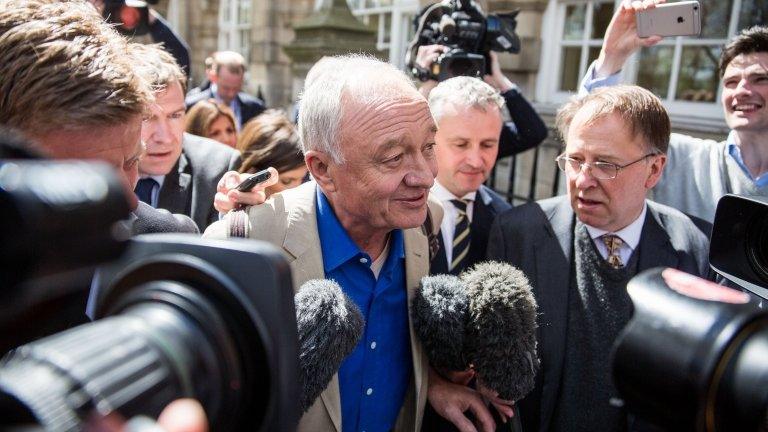Ken Livingstone: Profile of former London Mayor
- Published
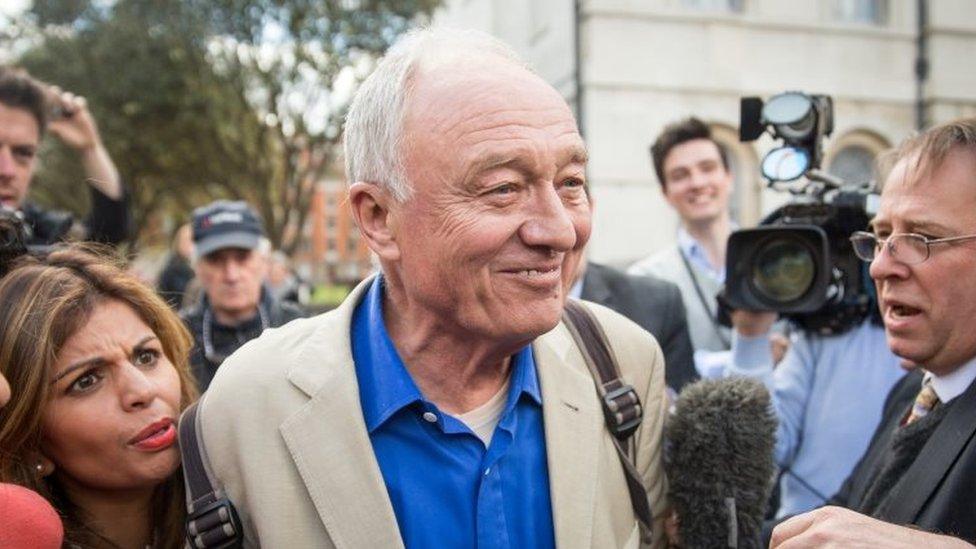
Ken Livingstone, who has resigned from the Labour Party after being suspended amid allegations of anti-Semitism, has had a long and often controversial political career.
Twice elected Mayor of London, once under his own independent banner after falling out with Tony Blair, he is one of the few figures in British politics to be routinely referred to by his first name - another being his nemesis, and Conservative successor as mayor, Boris Johnson.
Like Mr Johnson, he cultivated a quirky public image, with his pet newts and appearances on chat shows. He even lent his nasal tones to a track on a best-selling Blur album.
His way with a provocative soundbite was the making of him, propelling him to national prominence from the grey world of local government, but it has also got him into a lot of hot water over the years. Not for nothing is his autobiography called You Can't Say That.
He was suspended from office as mayor for four weeks in 2006 for comparing a Jewish journalist to a concentration camp guard - a comment he continues to be unrepentant about, saying it was a "fuss about nothing". The suspension was overturned in court.
Semi-retirement
He has also been repeatedly criticised for his decision to welcome controversial Muslim cleric Yusuf Al-Qaradawi, who condoned suicide bombings, to London in 2005. He said it was part of an effort to improve relations with the Muslim world.
He remained popular in left-wing circles as one of the few genuine socialists to have achieved real power in the UK - but he had largely disappeared from the political scene, following his defeat in 2012 mayoral contest, although he continued to be elected to Labour's ruling national executive committee.
He was enjoying semi-retirement when his old friend and ally Jeremy Corbyn was unexpectedly elected Labour leader in 2015.
The two go back a long way - they share the same political outlook and commitment to causes such as nuclear disarmament and Palestinian solidarity - and Mr Corbyn worked hard to get him to the top at the Greater London Council in the early 1980s.

Ken Livingstone factfile
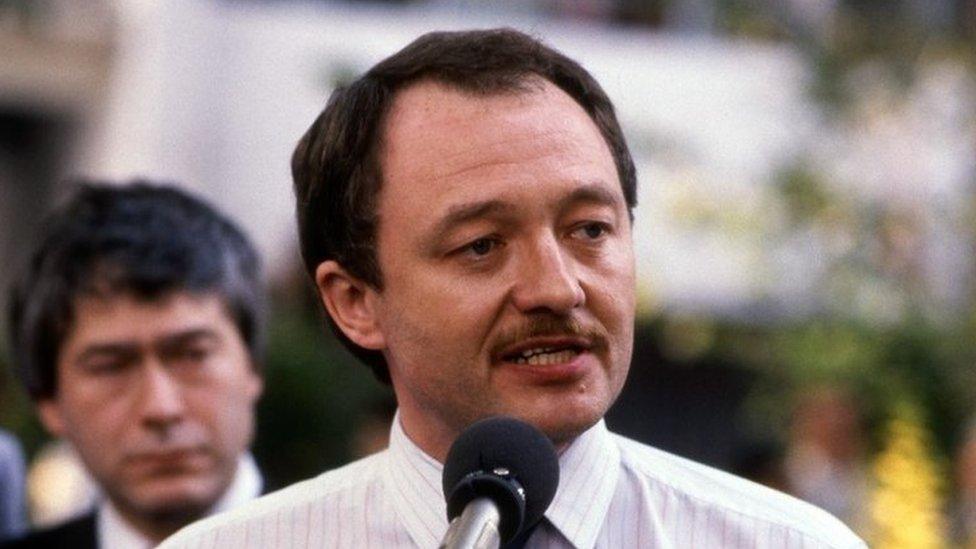
Age: 72
Marital status: Married his long-term partner in 2009. Two children with current partner and three other children.
Political party: Labour
Time served as Mayor: Two terms from 2000-2008
Previous jobs: MP for Brent East 1987-2001; leader GLC 1981-1986; London councillor; lab technician; journalist and broadcaster

Mr Corbyn drafted in advisers from Mr Livingstone's time in City Hall when he took on Labour's top job and Mr Livingstone himself became part of his inner circle.
Before long, the former London mayor was back on the airwaves as Mr Corbyn's chief defender, in the face of attacks from Blairite opponents.
He was also given a role on the party's defence review - but controversy, almost inevitably, followed.
He faced a barrage of criticism from Labour MPs - including Mr Corbyn himself - for suggesting Kevan Jones, a shadow defence minister who had suffered from depression, needed "psychiatric help" for suggesting he knew nothing about defence.
An apology eventually came but Mr Livingstone was soon in trouble again, over comments on BBC One's Question Time about how the 7/7 London bombers "gave their lives" to protest against the Iraq war.
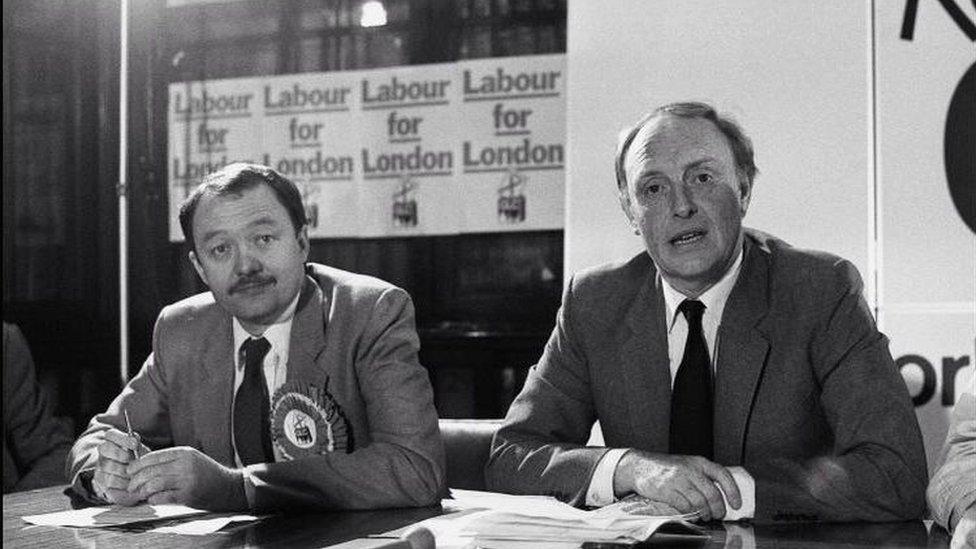
He then came under fire from Labour colleagues for describing a donation to Labour MP Dan Jarvis from a hedge fund as like "Jimmy Savile funding a children's group".
It later emerged Mr Livingstone himself had accepted £8,000 from a hedge fund, leading to accusations of hypocrisy.
He was suspended by the Labour Party in 2016 after suggesting in a BBC London interview that Hitler had been a supporter of Zionism "until he went mad and killed 6 million Jews".
His suspension was extended in March this year but Jewish groups and prominent Labour MPs have called for his expulsion. Announcing his resignation, Mr Livingstone denied that he jumped before he was pushed, but said his case was becoming "a distraction" to the party.
Born in Streatham, south London in 1945, Kenneth Robert Livingstone attended Tulse Hill Comprehensive before taking up a job as a lab technician working on cancer research in the Royal Marsden Hospital.
In 1971 he was elected to Lambeth Borough Council and that was the start of a long career in politics. Over the next 10 years he served as a local councillor and then on Greater London council before becoming the leader of the GLC in 1981.
After the GLC was abolished he crossed the River Thames to Westminster, winning the seat of Brent East in 1987.
'Disaster'
He had a child at the age of 57 with his long-term partner and later wife Emma Beal. At the time it was thought to be his first child but in 2008 it emerged that he already had three other children with another two women. Beal and Livingstone went on to have a second child in 2004.
He always had a difficult relationship with his own party. Frequently critical of Neil Kinnock, his battle with the party leadership did not diminish under Tony Blair.
In the run-up to the mayoral election of 2000 he failed to secure the Labour candidacy, losing out to the leadership favourite, Frank Dobson.
Mr Livingstone declared that he would stand as an independent candidate, and so Labour expelled him from the party.
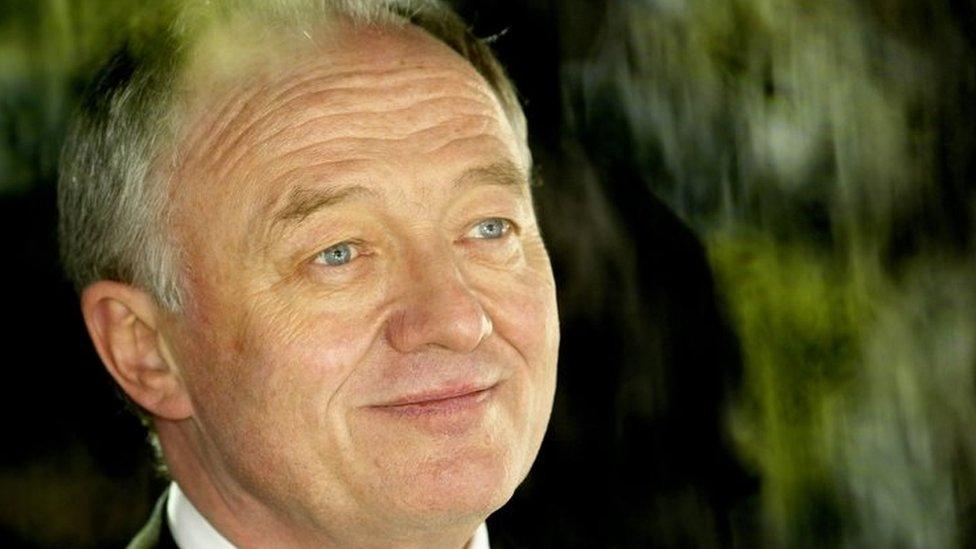
Standing as an independent far from scuppered him, and he won with 58% of the vote.
In 2000, Tony Blair had been critical of his prospects in office claiming he would be a "disaster". However Mr Blair had to eat his words when Livingstone was admitted back into the party ahead of the 2004 mayoral election which saw him re-elected.
"I think I should be big enough to say the prediction I made has not turned out right," Mr Blair said at the time.
Mr Livingstone's flagship mayoral policy was the introduction of the controversial congestion charge in central London, later extended to west London. He unsuccessfully fought the Labour government as it introduced a public-private partnership plan for the London Underground.
He was also involved with London's successful bid for the Olympic Games and in dealing with the aftermath of the terrorist attack of 2005. Even his opponent Boris Johnson praised him for speaking up for London after 7/7 and the failed attack several weeks later.
Left-wing hero
Mr Livingstone boasts achievements such as the introduction of the Oyster card for London transport, free use of public transport for under-18s in full-time education and a revival and increased usage of London buses. He also claims to have increased numbers of police on London's streets to a record level.
He faced attack for his links with the Venezuelan President Hugo Chavez, signing an oil deal with him in 2007 and when he lost the mayoral election in 2008 taking up a position as a consultant to Chavez, advising on urban planning.
Ken Livingstone has always divided opinion. Former Labour leader Neil Kinnock alleges that it was the former GLC boss who invented the "loony left" and who brought about the council's abolition by Prime Minister Margaret Thatcher.
Others were shocked by his call for dialogue with the IRA and championing of gay and ethnic minority rights - issues on which he now says he was "ahead of his time".
The Sun newspaper once described him as "the most odious man in Britain".
But he is still popular with many on the left of the Labour Party, who relished his role as a thorn in Lady Thatcher's side and for speaking his mind about his socialist beliefs, when all about him in the party were abandoning theirs.
It was, perhaps, ironic that as the leadership of the Labour Party started to come back to his way of thinking, he found himself suspended from it, and has now resigned from it.
- Published28 April 2016
